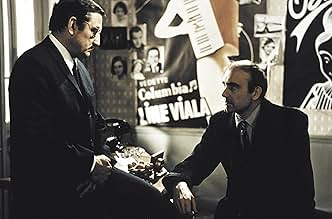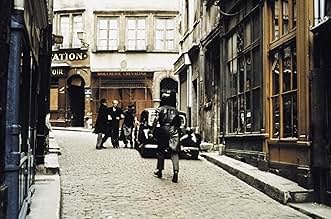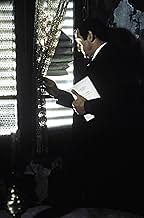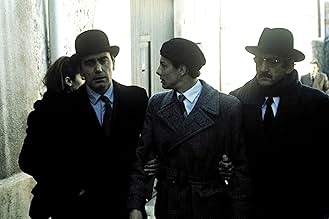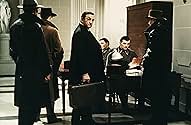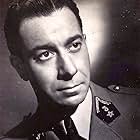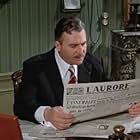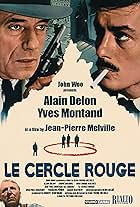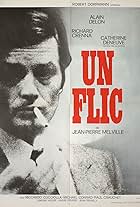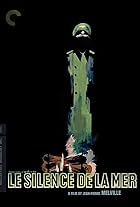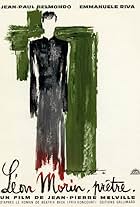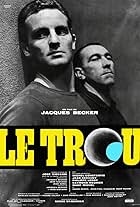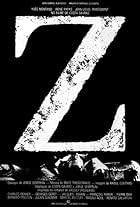Francia, 1942. Philippe Gerbier è un leader della resistenza francese. Attraverso i suoi occhi vediamo la resistenza con gli intrighi e lo spionaggio, la costante minaccia di essere catturat... Leggi tuttoFrancia, 1942. Philippe Gerbier è un leader della resistenza francese. Attraverso i suoi occhi vediamo la resistenza con gli intrighi e lo spionaggio, la costante minaccia di essere catturati dai tedeschi e le decisioni difficili.Francia, 1942. Philippe Gerbier è un leader della resistenza francese. Attraverso i suoi occhi vediamo la resistenza con gli intrighi e lo spionaggio, la costante minaccia di essere catturati dai tedeschi e le decisioni difficili.
- Premi
- 4 vittorie e 1 candidatura in totale
Trama
Lo sapevi?
- QuizCinematographer Pierre Lhomme claimed that the last surviving, watchable print of the movie had turned completely pink with age. He later supervised the 2k resolution, digital restoration of the film at the Eclair Laboratories in Paris.
- BlooperIn the London WWII sequence, double yellow lines are visible on the road. These were only introduced in the UK in 1956 and didn't become common until the 1960s; a few of the street signs have a style not known before the 1960s.
- Citazioni
Philippe Gerbier: See you, Comrade.
Legrain: You a communist?
Philippe Gerbier: No. But I do have comrades.
- ConnessioniFeatured in Mémoires pour Simone (1986)
Every episode in the film seems to lead to a darkly ironic conclusion, and the meaninglessness of their efforts becomes almost overwhelming, except that, somehow, these ordinary people continue to offer resistance in the face of death, so that their heroism lies not in the ability to stop the Germans but in taking action at all while facing the abyss.
While the acting is excellent all around, Lino Ventura's performance as Gerbier deserves special attention. It's hard to imagine any other actor bearing the tremendous weight of this film as well as he does. Gabin, at an earlier age, might have had the physical and emotional strength, but I'm not sure he would've been capable of Ventura's unassuming portrayal, which is so necessary for his character. The "shadows" at the core of this tale are seriously dark, and Ventura's Gerbier is strong enough to face them, yet modest enough to realize he can't conquer them on his own. The only way the Resistance makes sense by the end of this film, is in the collective effort of its members. Similarly, each of us, individually, cannot conquer death, but we as a group of human beings can continue to live on. _L'Armée des ombres_ ultimately moves beyond a story of the French Resistance in World War II and serves as a powerful existentialist epic, with Ventura's performance responsible for much of the film's dignity and humanity.
As with _Léon Morin, prêtre_ (1961), another story set during the war, Melville seems more emotionally present in _L'Armée des ombres_ than he does in his policiers or noir pieces, and after seeing the film, his overall body of work suddenly seems much heftier. While the movie isn't as visually daring of some of his other works, it has a dark beauty all its own, and his pacing, editing, shot selection, and use of sound show him in great artistic control. Forty-eight hours after seeing it, I still find myself caught in its world.
I più visti
Dettagli
- Data di uscita
- Paesi di origine
- Lingue
- Celebre anche come
- Army of Shadows
- Luoghi delle riprese
- Bunker de l'armée, Saint-Cyr-l'Ecole, Yvelines, Francia(execution by the Gestapo)
- Aziende produttrici
- Vedi altri crediti dell’azienda su IMDbPro
Botteghino
- Lordo Stati Uniti e Canada
- 861.983 USD
- Fine settimana di apertura Stati Uniti e Canada
- 12.620 USD
- 30 apr 2006
- Lordo in tutto il mondo
- 931.732 USD
Contribuisci a questa pagina




